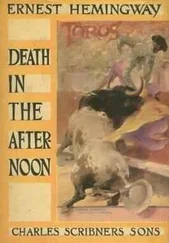'Sure,' the Colonel said and remembered, as unbitterly as he could. 'She had more ambition than Napoleon and about the talent of the average High School Valedictorian.'
'Whatever that is,' the girl said. 'But let's not speak about her. I'm sorry I asked the question. She must be sad that she is not with you.'
'No. She is too conceited ever to be sad, and she married me to advance herself in Army circles, and have better contacts for what she considered her profession, or her art. She was a journalist.'
'But they are dreadful,' the girl said.
'I agree.'
'But you couldn't have married a woman journalist that kept on being that?'
'I told you I made mistakes,' the Colonel said.
'Let's talk about something nice.'
'Let's.'
'But that was terrible. How could you have done such a thing?'
'I don't know. I could tell you in detail but let's skip it.'
'Please let's skip it. But I had no idea it was something as awful as that. You wouldn't do such a thing now, would you?'
'I promise you, my sweet.'
'But you don't ever write to her?'
'Of course not.'
'You wouldn't tell her about us, so she could write about it?'
'No. I told her about things once, and she wrote about them. But that was in another country and besides the wench is dead.'
'Is she really dead?'
'Deader than Phoebus the Phoenician. But she doesn't know it yet.'
'What would you do if we were together in the Piazza and you saw her?'
'I'd look straight through her to show her how dead she was.'
'Thank you very much,' the girl said. 'You know that another woman, or a woman in memory, is a terrible thing for a young girl to deal with when she is still without experience.'
'There isn't any other woman,' the Colonel told her, and his eyes were bad and remembering. 'Nor is there any woman of memory.'
'Thank you, very much,' the girl said. 'When I look at you I believe it truly. But please never look at me nor think of me like that.'
'Should we hunt her down and hang her to a high tree?' the Colonel said with anticipation.
'No. Let us forget her.'
'She is forgotten,' the Colonel said. And, strangely enough, she was. It was strange because she had been present in the room for a moment, and she had very nearly caused a panic; which is one of the strangest things there is, the Colonel thought. He knew about panics.
But she was gone now, for good and for ever; cauterized; exorcized and with the eleven copies of her re–classification papers, in which was included the formal, notarized act of divorcement, in triplicate.
'She is forgotten,' the Colonel said. It was quite true.
'I'm so pleased,' the girl said. 'I don't know why they ever let her into the hotel.'
'We're enough alike,' the Colonel said. 'We better not carry it too God–damned far.'
'You can hang her if you wish because she is why we cannot marry.'
'She's forgotten,' the Colonel told her. 'Maybe she will take a good look at herself in the mirror sometime and hang herself.'
'Now that she is out of the room we should wish her no bad luck. But, as a good Venetian, I wish that she were dead.'
'So do I,' the Colonel said. 'And now, since she is not, let us forget her for keeps.'
'For keeps and for always,' the girl said. 'I hope that is the correct diction. Or in Spanish para sempre .'
' Para sempre and his brother,' the Colonel said.
They lay together now and did not speak and the Colonel felt her heart beat. It is easy to feel a heart beat under a black sweater knitted by someone in the family, and her dark hair lay, long and heavy, over his good arm. It isn't heavy, he thought, it is lighter than anything there is. She lay, quiet and loving, and whatever it was that they possessed was in complete communication. He kissed her on the mouth, gently and hungrily, and then it was as though there was static, suddenly, when communications had been perfect.
'Richard,' she said. 'I'm sorry about things.'
'Never be sorry,' the Colonel said. 'Never discuss casualties, Daughter.'
'Say it again.'
'Daughter.'
'Will you tell me some happy things I can have for during the week and some more of war for my education?'
'Let's skip war.'
'No. I need it for my education.'
'I do too,' the Colonel said. 'Not manoeuvres. You know, in our army once, a general officer through chicanery obtained the plan of the manoeuvre. He anticipated every move of the enemy force and comported himself so brilliantly that he was promoted over many better men. And that was why we got smacked one time. That and the prevalence of week–ends.'
'We're on a week–end now.'
'I know,' the Colonel said. 'I can still count up to seven.'
'But are you bitter about everything?'
'No. It is just that I am half a hundred years old and I know things.'
'Tell me something more about Paris because I love to think of you and Paris in the week.'
'Daughter, why don't you lay off Paris?'
'But I've been in Paris, and I will go back there again, and I want to know. It is the loveliest city in the world, next to our own, and I want to know some things truly to take with me.'
'We will go together and I will tell you there.'
'Thank you. But tell me a little now for this week only.'
'Leclerc was a high–born jerk as I think that I've explained. Very brave, very arrogant and extremely ambitious. He is dead, as I said.'
'Yes, you told me.'
'They say you should never speak ill of the dead. But I think it is the best time to speak truly of them. I have never said anything of a dead that I would not say to his face,' and he added, 'in spades.'
'Let's not talk about him. I have re–classified him in my mind.'
'What do you want then; picturesque?'
'Yes please. I have bad taste from reading the illustrated papers. But I will read Dante all week while you are gone. I'll go to mass each morning. That should be enough.'
'Go to Harry's before lunch too.'
'I will,' she said. 'Please tell me some picturesque.'
'Don't you think we might better just go to sleep?'
'How can we go to sleep now when we have so little time? Feel this,' she said and pushed her whole head up under his chin until she forced his head back.
'All right, I'll talk.'
'Give me your hand first to hold. I'll have it in my hand when I read the Dante and do the other things.'
'Dante was an execrable character. More conceited than Leclerc.'
'I know. But he did not write execrably.'
'No. Leclerc could fight too. Excellently.'
'Now tell me.'
Her head was on his chest now, and the Colonel said, 'Why did you not want me to take off the tunic?'
'I like to feel the buttons. Is it wrong?'
'I'll be a sad son of a bitch,' the Colonel said. 'How many people fought in your family?'
'Everybody,' she said. 'Always. They were traders as well and several of them were Doges of this city as you know.'
'But they all fought?'
'All,' she said. 'As far as I know.'
'O.K.,' the Colonel said. 'I'll tell you any God–damn thing you want to know.'
'Just something picturesque. As bad or worse than in the illustrated papers.'
' Domenica Del Corriere or Tribuna Illustrata ?'
'Worse, if possible.'
'Kiss me first.'
She kissed him kind, and hard, and desperately, and the Colonel could not think about any fights or any picturesque or strange incidents. He only thought of her and how she felt and how close life comes to death when there is ecstasy. And what the hell is ecstasy and what's ecstasy's rank and serial number? And how does her black sweater feel? And who made all her smoothness and delight and the strange pride and sacrifice and wisdom of a child? Yes, ecstasy is what you might have had and instead you draw sleep's other brother.
Читать дальше
Конец ознакомительного отрывка
Купить книгу












